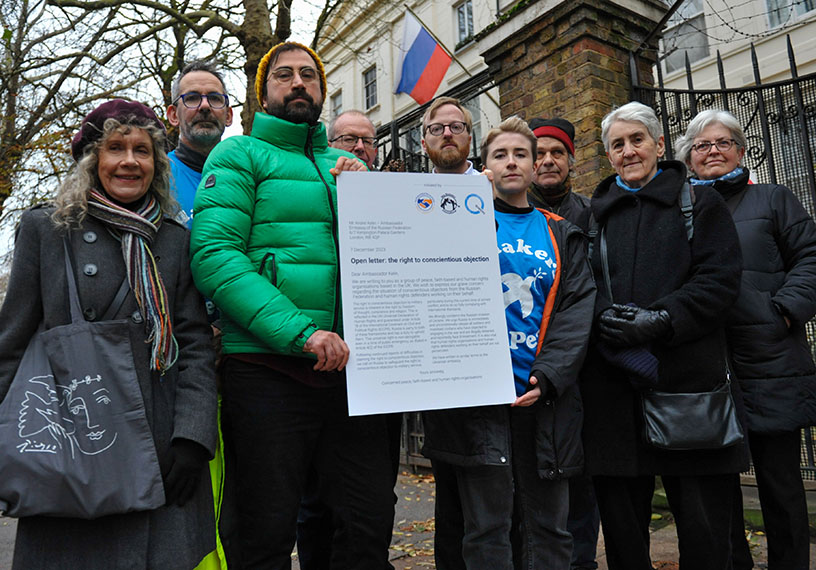Stop persecuting conscientious objectors in Russia and Ukraine, Quakers say
Quakers in Britain have joined other faith and civil society groups calling on the Russian and Ukrainian governments to respect the rights of conscientious objectors.

Letters delivered to the Ukrainian and Russian embassies in London on Thursday, 7 December, condemn Russia's war of aggression on Ukraine.
But with 20,000 Ukrainian men reportedly fleeing to avoid military service, signatories note that international human rights law means the right to conscientious objection cannot be suspended even in times of war.
The letter, co-ordinated by Quakers in Britain, Fellowship of Reconciliation and War Resisters International, urges the immediate and unconditional release of conscientious objectors.
As part of an international week of action in support of conscientious objectors from the region, signatories including Pax Christi and Churches Together in England write: “It is also vital to ensure that human rights organisations and human rights defenders working on their behalf are not persecuted."
Guaranteed by the UN Universal Declaration of Human Rights
Conscientious objection is recognised as an essential component of the right to freedom of thought, conscience and religion, guaranteed by the International Covenant on Civil and Political Rights and the UN Universal Declaration of Human Rights.
Ukraine and Russia are both party to these agreements, but the right to conscientious objection remains precarious in both states.
When Russia invaded in February last year, President Volodymyr Zelensky banned all men aged 18-60 from leaving Ukraine.
He also introduced martial law under which the limited right to alternatives to military service disappeared.
One conscientious objector has served a prison sentence while nine have been given suspended sentences.
In Russia evasion and desertion from military service can mean up to ten years in prison. At least four conscientious objectors have been jailed for refusing to fight in Ukraine on religious grounds.
Hundreds more Russian soldiers and mobilised civilians who object to participating in the war have been detained in detention centres, where they are reportedly subject to physical and psychological abuse.
Meanwhile, UK citizens are being urged to ask their MPs to pressure the UK government to uphold conscientious objection in the region.
The UK was the first state to legally recognise the right to conscientious objection and has been a leader in upholding the right since, Quakers say.
As such, the UK government should do more to defend the rights of conscientious objectors in the region, including using its diplomatic ties, the template letter suggests.
Write to your MP urging them to uphold conscientious objection